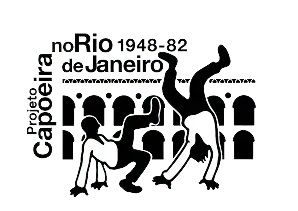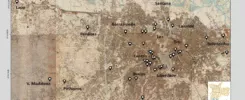By Matthias Röhrig Assunção.
The award “History of Capoeira in Rio de Janeiro” was a special competition of the Festival Galo já cantou organised by Radio Capoeira and Mestre Paulão Kikongo. The prize, sponsored by capoeirahistory.com was awarded by the jury to Mestre Alexandre Batata and his friends, in a session broadcast online, on 17/04/2021, for their song entitled “Capoeira in Rio de Janeiro from 1948 to 1988”. The judging commission was composed by mestra Janja, mestres Toni Vargas and Gegê, as well as historians Antonio Liberac and Matthias Assunção.
It was very interesting to see which were the favourite themes of this part of the festival. In the first place, without a doubt, the capoeira street rodas of Rio de Janeiro. Two songs, written by Thiago P. dos Santos (Orelha) and Mestre Poraquê, thematised the ‘Tradition Roda’, organised by Mestre Efraim in the period from 1986 to 2013, at the Tradição Samba School, North Zone of Rio de Janeiro. These songs remembered with nostalgia the meeting of bambas (tough guys) in this place and how much they learned there. Bruno Rodolfo Martins (Treinel Sabará) entered the festival with a ladainha (litany) about the traditional mass and roda as a posthumous tribute to Mestre Pastinha, that is taking place every year since 1982 on the 13 November next to the Church of Nossa Senhora do Rosário dos Homens Pretos e de São Benedito (Catholic Church and Brotherhood of Our Lady of the Rosary of the Black Men and Saint Benedict), on Rua Uruguaiana in downtown Rio de Janeiro.
Other songs evoked older times, like the “Time of the silk handkerchief”, the title of teacher Chu Capoeira’s song. Nazaré Avelar also sang about those old times of Capoeiragem in Rio de Janeiro, when “knifes, jackknifes and sticks were used”. Fernando Cruz sang a ladainha about the “Old Lapa of my Rio” thematizing the old bohemian neighbourhood where capoeira has had an important presence until today.
The song by Aurora Camboim Lopes de Andrade Lula (Chun-li) “A colibri sang me Rio de Janeiro’s fate” used the resource of a bird to tell this story, and with her beautiful voice, she won one of the Festival’s prizes for interpretation. Congratulations Chun-li!
Jeroen Verheul, better known in the world of capoeira as Rouxinol da Holanda, also sang about Lapa, remembering the times when it was the stronghold of tough guys.

He composed two songs (as authorised by the festival regulations). The second song gives a more general panorama of capoeira since the time of the maltas, and dedicates verses to the mestres who have stood out since the 1950s. These two songs took third and second place respectively. Rouxinol also was awarded a prize for interpretation. Congratulations Rouxinol!
Mestre Alexandre Batata, who started to work with capoeira in the city of Niterói and has resided in Portugal for many years now, presented a song which thematises capoeira between the arrival of Mestre Paraná in the 1940s, and the year 1988, the year of the centenary of the abolition of slavery. As he states, “these 40 years were fundamental for capoeira in Rio to create an identity.” The lyrics of his song (see below) reflect his knowledge of the many capoeira protagonists of that era, attributing characteristics to the key characters. Mestre Batata was a student of mestre Mintirinha and later of mestre Alcion. He explains, “By irony the only one I did not meet was Mestre Paraná.”
Congratulations Mestre Alexandre Batata for your contribution! For those who want to know more about his work, we recommend M Alexandre Batata’s channel on YouTube.




